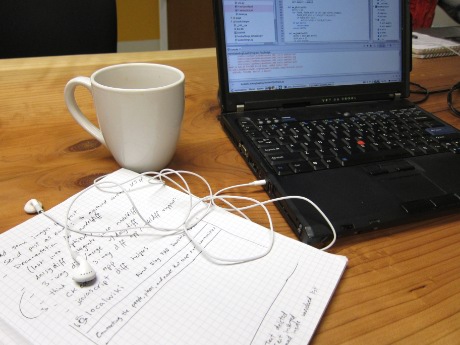Laying the groundwork
The LocalWiki project has officially started! A few of you have been wondering what we’ve been up to since the pledge drive, so we want to give you a quick update. For those of you who are more technically inclined, we hope to also provide an insight into these early stages of our process.
If you want to follow our updates in the future, please sign up with your email address at https://localwiki.org, follow us on Twitter at http://twitter.com/localwiki, or follow this blog. Or if you’re a huge geek, join us on IRC in Freenode’s #localwiki.
Besides working on fulfilling all of your Kickstarter pledge rewards (CD’s and t-shirts are going out soon!), we are ramping up development of the wiki software that will provide the platform for all of our pilot projects. Starting in October, Philip and I have been working out of our awesome coworking office in San Francisco (shout out to NextSpace) and laying the groundwork for this new platform.

Making software that lasts
This probably won’t make much sense unless you’re a techie, but here are some details about what’s going on:
Our initial focus at this stage is to build a set of reusable Django apps that will provide the core functionality of an extensible and easy to use wiki software, which include making it straightforward to edit a page, tracking and working with revisions of pages and other objects, and letting people compare those revisions to see what’s been changed. We will then use these components to build the first functional iteration of our wiki software. The benefits of this approach are that it helps us focus on each aspect separately, will help developers in the Django community to understand and contribute to our code, and makes it possible for other projects and organizations to use only the parts they might find useful. Software only survives if many people actively use it, and we want to ensure our software a long and happy life.
Next few months, roughly speaking
November-December: Core software. We create the central components of the wiki software and put them together into something that will enable folks to start creating awesome content. We unfortunately have to work out some legal issues around licensing before we can easily accept outside code contributions.
As soon as our licensing issues are resolved, we’ll send out an update with information about how to get involved with the development process. We hope the licensing issues will be resolved in the next couple of weeks. Nevertheless, it may be difficult for outside developers to get involved at this point because core bits and pieces will be moving and changing at a rapid rate.
December-March: Focus on features. We will push heavily to involve more outside developers to help make our software awesome and get some initial user feedback. If you are a developer interested in helping, this will be the best time for you to get involved because we will have somewhat solidified our development processes and underlying, core software. We will also need help with and feedback about the software from a higher level (e.g. feature requests).
March and beyond: Pilot communities, educational materials, community outreach. With the wiki platform largely built, we can start new pilot projects and educating potential users about building successful local projects. At this stage we will need all the help we can get from you to select pilots, write helpful guides, submit bug reports, and develop a model for communities to follow.



